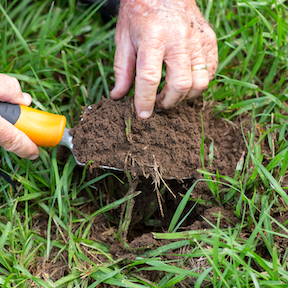A new UF/IFAS Extension document from Soil and Water Sciences Department (SWS) researchers highlights the important role of nitrogen (N) in Florida soils. The element is necessary for healthy plants. However, properly managing soil N levels can be tricky.
“The goal of this article is to provide an overview of the nitrogen cycle and the key transformations that result in soils gaining or losing this essential element for plant growth,” said Clayton Nevins, lead author and SWS doctoral candidate. “With practical examples in crop production and lawn management, this article can be a resource for growers and homeowners seeking to understand and manage nitrogen in Florida soils.”

Most of Earth’s N is found in the atmosphere and rocks, where it is unavailable for plants and organisms to use. However, there are many N cycling transformations that result in N available to support biota. For example, N fixation can directly add N to the soil through biotic and abiotic processes.
“The nitrogen cycle is complex, and it is important to understand and manage N cycling processes to maintain adequate soil N levels for plant growth without detrimental environmental side effects,” Nevins explained.
The publication also covers the following N related topics:
- Immobilization
- Mineralization
- Nitrification and Denitrification
- Plant N Uptake
- Leaching
- Volatilization
Nevins authored the publication with Sarah Strauss, assistant professor of soil microbiology, and Patrick Inglett, associate professor of biogeochemistry. Both are SWS faculty who are advising Nevins on his doctoral studies.
You can read the publication, An Overview of Key Soil Nitrogen Cycling Transformations, here: https://edis.ifas.ufl.edu/ss684
 0
0
